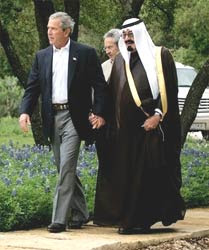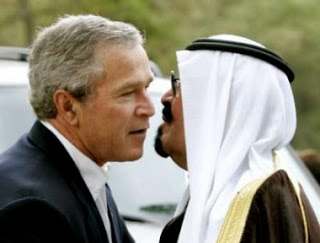Will Saudi Arabia Bail Out Bush Again?

The unspoken – or at least rarely spoken – consensus of establishment scholars holds that presidential “greatness” is made manifest in an aggressive disdain for the Constitution. The “great” men who dominate the presidential pantheon — tyrants and usurpers like Lincoln, Wilson, and FDR — ignored the constitutional limits on presidential authority, invoking wartime emergencies to justify centralization of power in the executive.
George W. Bush’s accomplishments in this realm may elevate him over those three titans of the post-constitutional presidency. This isn’t because he’s mastered the Machiavellian subtleties of power, or devised some exotic new rationale for presidential autocracy. Rather, it’s because his boundless sense of personal privilege is a perfect fit for the ideologues who surround him – war-obsessed social engineers who understand the evil symbiosis between perpetual war abroad and a dictatorial presidency on the domestic front.
Last Sunday, Secretary of State Rice dropped several gravid hints that in the event Congress seeks to reclaim its war powers – by repealing or modifying its 2002 “authorization” of war against Iraq, by withdrawing funding for the war, or by imposing conditions on the continued deployment of troops to the region — Bush will simply ignore its enactments.
After condemning Congress for what she called “the worst of micromanagement of military affairs,” Rice was asked on Fox “News” whether Bush would consider himself “bound” by legislation requiring the withdrawal of combat troops within 120 days.
“The president is going to, as commander in chief, need to do what the country needs done,” she replied, striving to craft a sentence that was at once clear with respect to the Regime’s assertion of presidential power, and opaque regarding the crimes it contemplates against the Constitution.
In setting out its version of the doctrine Rice alluded to, the Organization Book of the German National Socialist Party used more elegant language, insisting that the chief executive, unlike the legislature, embodies the “collective will” of the people, and exercises power that is “independent, all-inclusive, and unlimited,” for which he is accountable “only to his conscience.”
Translated from German into soundbite-ready contemporary English, that’s a pretty good summary of the Bush doctrine of executive power.
There is little appetite on Capitol Hill for a face-off on the matter of war powers: The Democrats are content to nibble at the margins of Bush’s Iraq policy. And this is pretty much all they can do, since most Democrats in Congress signed off on the 2002 resolution that supposedly authorized the war in Iraq – a measure with no constitutional legitimacy through which Congress abdicated its exclusive power to commit our nation to war.
In addition to vesting the war decision in Congress, the Constitution gives the legislative branch plenary authority over funding and regulating the military. The role assigned to the president is entirely contingent and derivative. Congressional “micro-management” of a war, whatever one thinks of it from a prudential perspective, is entirely appropriate under the Constitution.
Given that the Iraq war was illegitimate from the beginning, the only suitable course of action would be for Congress to de-fund it, and order (yes, order) Bush to bring the troops home.
Were we the moral, Christian nation we advertise ourselves to be, after our troops were back Congress would issue a national apology to Iraq for the unprovoked, unjust war our government launched upon it, and order (yes, order) Bush and his handlers to travel to Baghdad to deliver it in person. It would then enact a measure providing reparations to Iraq, which is the duty of every nation that launches a war of aggression. (Reparations in this case would be a sum sufficient to repair the country’s infrastructure and oil industry; this would make it economically viable once again, and would be far less expensive than continuing the war.)
This is a whole lot of ain’t-gonna-happen, of course, even though it should.
What could happen, however, if opposition to the war continues to build, might be a version of the conflict that erupted at the end of WWI (described in Thomas Fleming’s superb book The Illusion of Victory), when Congress threatened to issue a formal declaration ending the war. Woodrow Wilson, who by that time had descended into a state of self-enraptured megalomania rivaling that of Bush, intended to keep US troops in Europe to use in punitive action against Germany had that nation – already starving and prostrate as the result of a food embargo – resisted any provision of the Versailles Treaty.
Wilson was eventually forced to concede, and “normalcy” was restored. I wouldn’t expect that the delusional man-child currently occupying the Oval Office would prove to be as reasonable were Congress to enact a binding measure ending the war.
If Congress were to cut off funding, it’s possible that Bush and his cronies, who (as mentioned yesterday) include veterans of the Iran-Contra plot from the mid-1980s, would ignore the legislative branch and turn to Saudi Arabia or other shadowy sources for funds to continue the war.
After all, as Seymour Hersh points out, the Bush regime’s covert operations in the Gulf region have been drawing on “many, many pots of black money, scattered in many places and used all over the world on a variety of missions,” in the words of a Pentagon consultant. “The budgetary chaos in Iraq, where billions of dollars are unaccounted for, has made it a vehicle for such transactions, according to the former senior intelligence official and the retired four-star general.”
In many of those clandestine operations, Hersh points out, the administration has left “the execution or the funding to the Saudis, or by finding other ways to work around the normal congressional appropriations process, current and former officials close to the Administration said.” During a “surprise meeting” in Saudi Arabia last November, King Abdullah warned Dick Cheney “that Saudi Arabia would back its fellow-Sunnis in Iraq if the United States were to withdraw.” In the interest of holding the Shi’ites at bay, one intelligence official told Hersh, “The Saudis are starting to use their leverage—money.”
Hey, get a room: Bush and Saudi King Abdullah
In the event that Congress were to cut off money for the Iraq war, would it be possible that George W. Bush – whose business career was bailed out by the Saudis – would turn to the Saudis for stopgap funding for his illegal war?
After all of the other crimes he’s committed against our Constitution and national independence, why would Bush be reluctant to do this, if the occasion presented itself?
Content retrieved from: http://freedominourtime.blogspot.com/2007/02/will-saudi-arabia-bail-out-bush-again.html.




